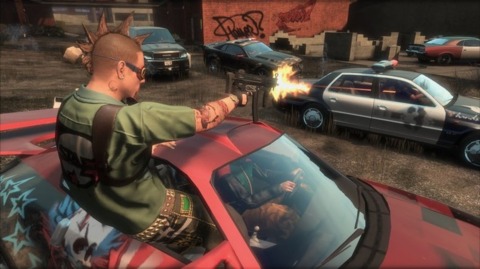Giving APB: Reloaded a second shot
GDC Europe 2011: GamersFirst CTO and COO Bjorn Book-Larsson discusses the challenges involved in preparing the once-scuttled crime MMOG for rerelease.
Who was there: Bjorn Book-Larsson, CTO and COO of GamersFirst, discussed the challenges his team has faced since acquiring the ill-fated massively multiplayer online game APB: All Points Bulletin back in 2009. He also offered some general advice for free-to-play developers and publishers.

What he talked about:The development process for APB spanned five years and cost developer Realtime Worlds between $60 and $105 million, well over its original $50 million budget. All this money bought the game an extensive character creator, vehicle customization suite, music mixer, and numerous other perks. But all these parts didn't add up to a successful game, and two months after it launched, APB was shut down.
A poor critical reception didn't help the matter. The game averaged a 58 on reviews aggregating site Metacritic, with many outlets taking umbrage with the game's restrictive mission system. Some reviewers also didn't like the fact that when they first loaded up the game, they got "creamed" by more experienced players right away.
Normally, this would have been the end were it not for the small, privately owned publisher GamersFirst. This publisher spawned a smaller company, Reloaded Productions, back in 2009 to assume ownership of the defunct MMOG. After changing the game's name to APB: Reloaded, Reloaded Productions began work on updating the project by addressing the issues detailed by fans and the press and preparing it for a rerelease using a free-to-play business model.
For Reloaded Productions, Book-Larsson explained, addressing these issues meant building new maps, new game modes, and giving the player the option to select which game mode he or she wanted to play. And this process hasn't been easy. "The original maps are extremely large and they're built on hard-to-modify technology," he said. "We can't change a single building without changing the entire city as well." Therefore, the development team has set the old maps aside and is focusing on designing new maps using more flexible technology.
Other issues, such as the game's poor skill rating system, general lack of direction, and "dislike of 32-bit Windows," are also undergoing revisions. But one of the biggest changes is the switch from a subscription-based business model to a free-to-play one. Book-Larsson is certain this will benefit the game and the company in the long run. The challenge with the subscription model is that companies have to have a near-perfect game from launch, he explained. It also relies heavily on the game selling a lot of copies right away to establish a sustainable subscription base.
By comparison, the free-to-play model takes much longer--almost four years--to hit peak profits. This takes a lot of foresight on the side of the developers to ensure they have enough resources left over after launch to continue supporting the game and addressing the needs of the consumers.
Of course, a game can't please all of the players all of the time, which is an issue Reloaded Productions has been grappling with ever since unveiling its plans to monetize the game. Reloaded's in-game story will feature all the extras a player would expect from a free-to-play game, including cosmetics; experience- and currency-boosting items; and weapons. Book-Larsson admits that the team has received a lot of flak for the latter entry, with fans worried that this would become a "pay to win" scenario. He is confident that his design team has built purchasable weapons that offer gun specializations, rather than being overpowered.
For future free-to-play developers and publishers, Book-Larsson offered two words of advice: Don't panic. He expanded on this by suggesting companies launch their free-to-play game "almost before the game is ready" to see what players actually do in the game and how it responds. Companies should also prepare for constant iterations and long-term changes to the game's mechanics over a four-to-eight year cycle.
Quotes:"I think the next generation of consoles would be silly not to include the ability to easily support free-to-play games."--Bjorn Book-Larsson, on the future of free-to-play games.
"You have to remember that even the smallest change will outrage players who have been with the game for longer than two weeks."--Bjorn Book-Larsson, on developing a free-to-play game.
Takeaway: GamersFirst and Reloaded Productions have some ideas on how to improve APB's design, but the implementation of those ideas hasn't been easy. Still, it's great to see a game that died before its time receive another chance at success.
Got a news tip or want to contact us directly? Email news@gamespot.com
Join the conversation